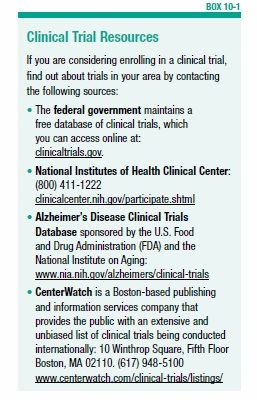10. Getting Help for Memory Problems
When memory problems start to interfere with your daily life, it may be time to call a specialist. This list can help you sort out the different types of professionals who treat memory problems:
Professionals Who Treat Memory Problems
Geriatric Psychiatrists (MDs)
These physicians specialize in caring for older adults. Their extensive medical training has given them a thorough knowledge of the body’s functions and the complex relationship between emotional illness and other medical illnesses in older individuals. They are well qualified to distinguish between physical and psychological causes of disorders, and are expert at dealing with memory problems that involve psychiatric issues, such as major depression, anxiety, agitation, or psychotic symptoms such as delusions.
Geriatric Psychologists (PhDs)
Geriatric psychologists hold PhD degrees in psychology. They specialize in the psychological assessment and treatment of mental and nervous disorders that are more typical in older adults. Geriatric psychologists focus on issues involving memory, competency, depression, anxiety, or adjustment difficulties. Through testing and therapy, they help older adults who experience anxiety, depression, or other psychological problems associated with memory loss.
Geriatricians (MDs)
These physicians specialize in caring for older adults, and in preventing and treating diseases and disabilities that tend to occur later in life. Geriatricians treat Alzheimer’s disease, as well as medical issues that may complicate memory problems in older adults, such as Parkinson’s disease, cardiovascular issues, or chronic pulmonary disease.
Neurologists (MDs)
These specially trained physicians diagnose and treat disorders of the nervous system. They focus on diseases of the brain, spinal cord, nerves, and nerve centers, and are often consulted for neurological and memory problems such as Parkinson’s disease, multiple sclerosis, and Alzheimer’s disease. Neurologists are particularly knowledgeable about brain regions and their role in physical and mental functioning.
Research Trials
One way to get access to groundbreaking memory disorder treatments, at no cost to you, is to enroll in a research trial offered by one of the major medical institutions in your area (see Box 10-1, “Clinical Trial Resources”). A clinical trial is a research study that uses human volunteers in a highly safe and controlled manner to determine whether new therapies are safe and effective.
People who enroll in clinical trials may benefit from their participation, but they also must be aware that there is risk, since these treatments are not yet proven. Trials offer cutting-edge therapy options that are not yet available to the public, and give participants the opportunity to receive care from top-tier providers. By working directly with medical researchers, you can also learn about the latest medical advances. And participating in a clinical trial gives you an opportunity to help improve the health of others who might benefit from new treatments in the future.
The post 10. Getting Help for Memory Problems appeared first on University Health News.
Read Original Article: 10. Getting Help for Memory Problems »
Powered by WPeMatico



